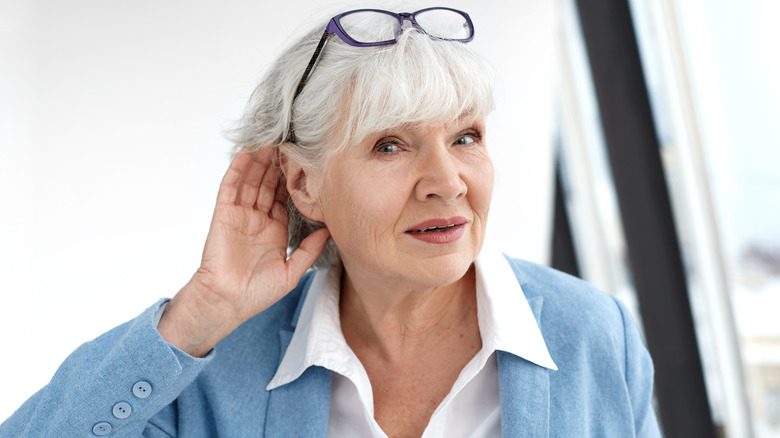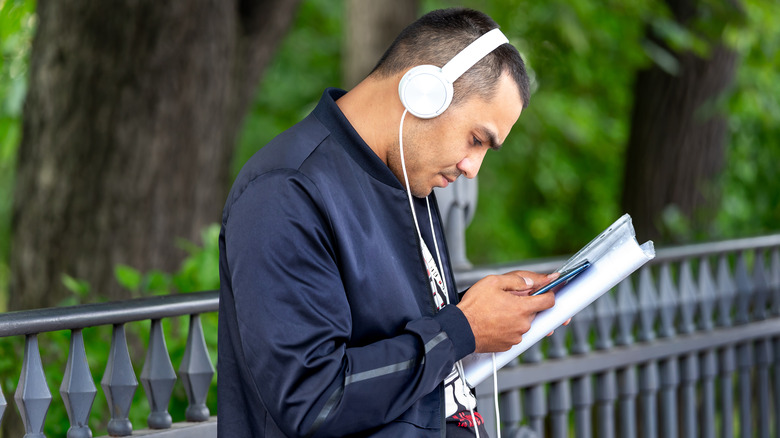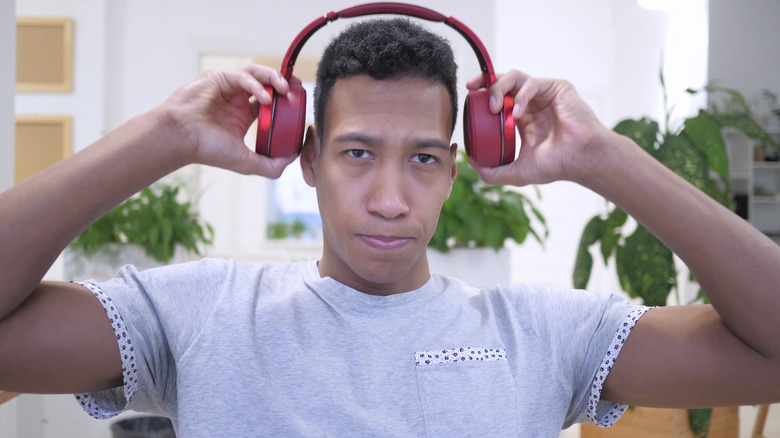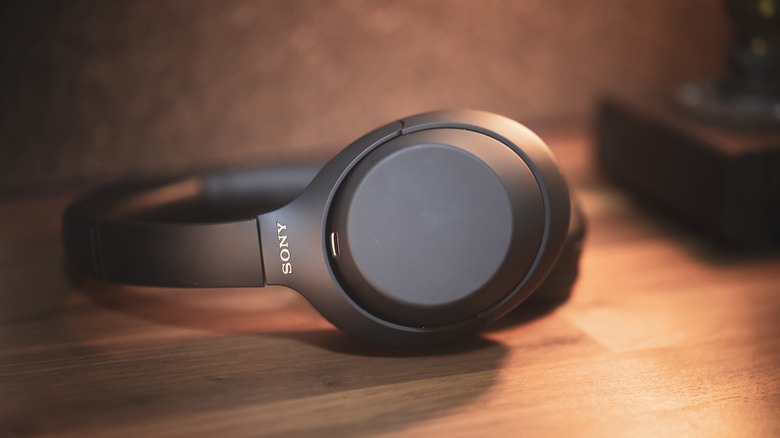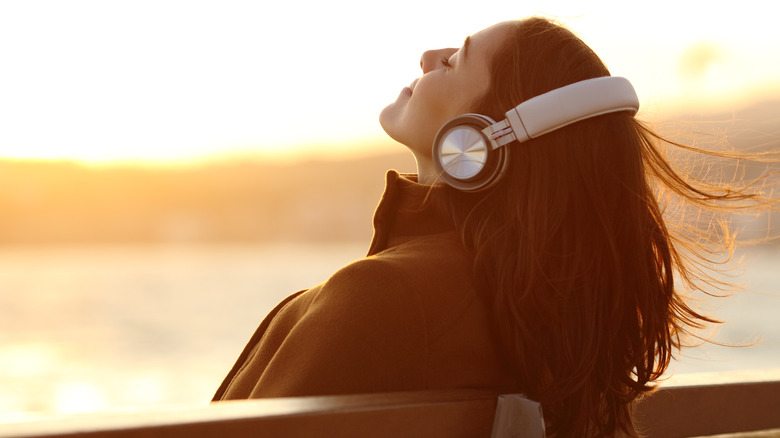How To Prevent Hearing Loss While Wearing Headphones
Headphones are as much a part of our lives as our mobile devices. While headphones can enrich the listening experience, music that is too loud or listened to for too long can damage your hearing and possibly lead to hearing loss. Hearing loss caused by loud noises is called noise-induced hearing loss, and it can happen at any age, according to the National Institute on Deafness and Other Communication Disorders.
Harvard Health Publishing explains our ears are sensitive, and the tiny hairs in the inner ear are quite delicate and excess sound can damage them. Injured hairs have a difficult time relaying sound signals to the brain. This problem is a serious one, because hearing loss impacts many aspects of our lives, per World Health Organization. The agency reports that 1.1 million young people are at risk for hearing loss due to using headphones improperly. But there are ways to safely use headphones to prevent hearing loss.
Turn it down
One of the easiest things you can do to prevent hearing loss when listening to headphones is to simply keep the volume down. The Centers for Disease Control and Prevention (CDC) explains that noise over 70 decibels for long periods of time may impair hearing, and exposure to noise above 120 decibels can cause immediate damage. The Hearing Health Foundation reports that many headphones can reach as high as 100 and 120 decibels, per the American Osteopathic Association (AOA).
Because headphones can reach such high sound levels, one of the safest protocols is to keep the volume down. James E. Foy, DO, an osteopathic pediatrician from Vallejo, California, tells the AOA that if you can't hear any of the noises around you with your headphones on, the volume is too loud. New York-based otolaryngologist Tahl Colen, tells Allure that if others can hear the music you're listening to, the volume is too high. The AOA recommends that you never go over 50% to 60% of the maximum volume.
Limit the time you use them
Speaking of volume, the AOA recommends limiting listening to your headphones to no more than 60% of its maximum volume for 60 minutes a day. Moreover, if you listen to anything at maximum volume, you shouldn't do it for more than five minutes. You should also take breaks from using headphones every hour. If you do listen to music for periods of time longer than an hour, you should be listening to it at lower volumes to avoid any hearing damage.
The World Health Organization (WHO) reports that safe listening behavior involves not only the volume of your headphones, but how long you listen to them, and how frequently you are exposed to other loud noises. Their "safe level" for leisure noise is below 80 decibels for a maximum of 40 hours per week. This includes time spent listening to music, playing games, and watching television shows and movies.
Consider noise-canceling headphones
You can also invest in a pair of noise-canceling headphones to protect your hearing. These types of headphones cover up any external noises, and by doing so, they might keep you from turning up the volume to hear over those noises, per WebMD. Kevin H. Franck, Ph.D., Director of Audiology at Massachusetts Eye and Ear at Harvard Medical School, tells Consumer Reports that noise-canceling headphones could be the best kinds of headphones to prevent hearing loss.
That said, you should be selective about when you use noise-canceling headphones. Suman Golla, associate professor of otolaryngology at the University of Pittsburgh School of Medicine, tells Allure that you shouldn't use these kinds of headphones when you need to be aware of your surroundings. For instance, when you're exercising outdoors, driving, or walking home alone, it pays to be aware of external sounds, which can impact your safety. Always use your best judgment when deciding when to use your headphones.
Use headphones that cover your ears
Earbuds are convenient and easier to carry than headphones, but that doesn't mean they are better for your hearing. In fact, they are more dangerous because of how close they sit to the inner workings of your ear. In contrast, over-the-ear headphones are farther away from the inner ear, and that space is critical when it comes to protecting your hearing (via WebMD). Not only that, but earbuds are simply louder than headphones — and while louder might sound better, that actually can turn out to be bad for your hearing. Dr. Colen explains that earbuds can increase sounds by as much as 9 decibels compared to over-the-ear headphones (via Allure).
Over-the-ear headphones also cancel out more external noises that might make you want to turn up the volume. Audiologist Sharon Sandridge, PhD, tells Cleveland Clinic that spending a little more for quality headphones will also provide better sound without having to increase the volume.
Be proactive when it comes to your hearing
The WHO explains that being able to recognize the signs of hearing loss is critical if you want to protect your hearing. Regular hearing tests are one way you can stay on top of the health of your hearing. But there are other ways you can be proactive in-between visits. One way you can know if you've been listening to headphones for too long (or too loud) is how your ears react when you take them off. "If you experience tinnitus or a ringing or buzzing in your ears after removing your device, or you experienced dulled hearing after pulling out your headphones, your music is too loud," explains Colen, per Allure.
The WHO reports that most devices come with apps that monitor listening behavior. Some of them can set limits on the time you spend listening to headphones, and they can also alert you if you are listening to music too loud. Tracking your listening habits can go a long way in reducing the risks of hearing loss.

